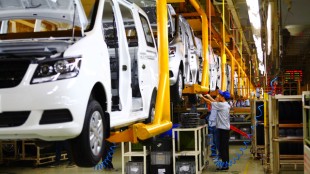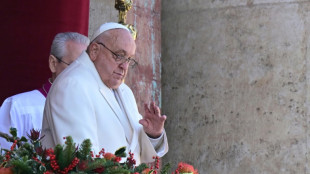
-
 Turkey lowers interest rate to 47.5 percent
Turkey lowers interest rate to 47.5 percent
-
Syria authorities launch operation in Assad stronghold

-
 Record number of migrants lost at sea bound for Spain in 2024: NGO
Record number of migrants lost at sea bound for Spain in 2024: NGO
-
Kohli called out over shoulder bump with Konstas during fourth Test

-
 Rural communities urged to flee east Australia bushfire
Rural communities urged to flee east Australia bushfire
-
Sri Lanka train memorial honours tsunami tragedy

-
 Australia's top order fires to take charge of 4th Test against India
Australia's top order fires to take charge of 4th Test against India
-
S. Korea's opposition moves to impeach acting president

-
 'We couldn't find their bodies': Indonesian tsunami survivors mourn the dead
'We couldn't find their bodies': Indonesian tsunami survivors mourn the dead
-
Azerbaijan mourns 38 killed in plane crash in Kazakhstan

-
 Konstas and Khawaja put Australia on top in 4th Test against India
Konstas and Khawaja put Australia on top in 4th Test against India
-
Lakers pip Warriors after another LeBron-Curry classic

-
 India readies for 400 million pilgrims at mammoth festival
India readies for 400 million pilgrims at mammoth festival
-
Nepal hosts hot air balloon festival

-
 Asia stocks up as 'Santa Rally' persists
Asia stocks up as 'Santa Rally' persists
-
Tears, prayers as Asia mourns tsunami dead 20 years on

-
 Sydney-Hobart yacht crews set off on gale-threatened race
Sydney-Hobart yacht crews set off on gale-threatened race
-
Key public service makes quiet return in Gaza

-
 Fearless Konstas slams 60 as Australia take upper hand against India
Fearless Konstas slams 60 as Australia take upper hand against India
-
Bridges outduels Wembanyama, Celtics lose again

-
 Hungry Sabalenka ready for more Slam success
Hungry Sabalenka ready for more Slam success
-
SMX Integrates Its Proprietary Coating and Digital Platform Technology for NFC & RFID Chip Markings and Protection

-
 DeepWay Completed 750 Million RMB Series B Financing to Accelerate the R&D of Intelligent New Energy Heavy Trucks
DeepWay Completed 750 Million RMB Series B Financing to Accelerate the R&D of Intelligent New Energy Heavy Trucks
-
Mass jailbreak in Mozambique amid post-election unrest

-
 Azerbaijani jet crashes in Kazakhstan, killing 38
Azerbaijani jet crashes in Kazakhstan, killing 38
-
Bridges outduels Wembanyama as Knicks beat Spurs

-
 2004 Indian Ocean tsunami: what to know 20 years on
2004 Indian Ocean tsunami: what to know 20 years on
-
Asia to mourn tsunami dead with ceremonies 20 years on

-
 Syrians protest after video of attack on Alawite shrine
Syrians protest after video of attack on Alawite shrine
-
Russian state owner says cargo ship blast was 'terrorist attack'

-
 38 dead as Azerbaijani jet crashes in Kazakhstan
38 dead as Azerbaijani jet crashes in Kazakhstan
-
Crisis-hit Valencia hire West Brom's Corberan as new boss

-
 Suriname ex-dictator and fugitive Desi Bouterse dead at 79
Suriname ex-dictator and fugitive Desi Bouterse dead at 79
-
35 feared dead as Azerbaijani jet crashes in Kazakhstan

-
 Pope calls for 'arms to be silenced' in Christmas appeal
Pope calls for 'arms to be silenced' in Christmas appeal
-
Syria authorities say torched 1 million captagon pills

-
 Pope calls for 'arms to be silenced' across world
Pope calls for 'arms to be silenced' across world
-
32 survivors as Azerbaijani jet crashes in Kazakhstan

-
 Pakistan air strikes kill 46 in Afghanistan, Kabul says
Pakistan air strikes kill 46 in Afghanistan, Kabul says
-
Liverpool host Foxes, Arsenal prepare for life without Saka

-
 Japan FM raises 'serious concerns' over China military buildup
Japan FM raises 'serious concerns' over China military buildup
-
Pope's sombre message in Christmas under shadow of war

-
 Zelensky condemns Russian 'inhumane' Christmas attack on energy grid
Zelensky condemns Russian 'inhumane' Christmas attack on energy grid
-
Sweeping Vietnam internet law comes into force

-
 Pope kicks off Christmas under shadow of war
Pope kicks off Christmas under shadow of war
-
Catholics hold muted Christmas mass in Indonesia's Sharia stronghold

-
 Japan's top diplomat in China to address 'challenges'
Japan's top diplomat in China to address 'challenges'
-
Thousands attend Christmas charity dinner in Buenos Aires

-
 Demand for Japanese content booms post 'Shogun'
Demand for Japanese content booms post 'Shogun'
-
As India's Bollywood shifts, stars and snappers click


Four decades of horror after India's Bhopal gas disaster
Just after midnight as poisonous plumes of smoke wafted through the Indian city of Bhopal four decades ago, Gas Devi was born, gasping for every breath.
Her feeble cries were drowned out by the screams of men, women and children as they ran to escape the cloud of highly toxic gas leaking from the Union Carbide factory on the night of December 2, 1984.
Some 3,500 people were killed in the immediate aftermath, and up to 25,000 are estimated to have died overall in the world's deadliest industrial disaster.
Forty years later, the horror continues to blight the lives of those like Devi -- as well as countless others born with deformities since that fateful night.
Devi, a daily wage labourer, has constant pain in her chest, one of her lungs is not developed fully and she keeps falling sick.
"My life is a living hell," Devi told AFP, speaking at her shanty in Bhopal, the capital of the central state of Madhya Pradesh.
Even if she wanted, she cannot forgot the night she was born.
"My parents named me Gas," she said, her eyes welling up. "I believe this name is a curse. I wish I had died that night".
Twenty-seven tonnes of methyl isocyanate (MIC), used in the production of pesticides, swept through the city of over two million people after one of the tanks storing the deadly chemical shattered its concrete casing.
As the white cloud of MIC shrouded areas close to the factory, people started collapsing in the streets.
Nathuram Soni, now 81, was among the first to rush out.
"People were frothing from their mouths. Some had defecated, some were choking in their own vomit," said Soni.
A handkerchief tied over his nose, Soni used his pushcart to carry his wailing neighbours, many of them infants, to hospital.
- Unrelenting tragedy -
Rashida Bee, co-founder of the Chingari Trust charity that offers free treatment to children of gas-affected families, believes those who died were fortunate.
"At least their misery ended," she said. "The unfortunate are those who survived".
Her trust has seen more than 150 children being admitted this year alone with cerebral palsy, hearing and speech impairments and other disabilities.
She blames the disorders on the accident and the contamination of the groundwater.
Testing of groundwater near the site in the past revealed cancer- and birth defect-causing chemicals 50 times higher than what is accepted as safe by the US Environmental Protection Agency.
"This tragedy is showing no signs of relenting," said Rashida, 68, who has lost several members of her family to cancer since the accident.
"The soil and water here are contaminated -- that is why kids are still being born with deformities."
Union Carbide, which was acquired by the Michigan-based Dow Chemical Company in 2001, routinely dumped chemical waste years before the disaster, campaigners say.
Large evaporation ponds outside the factory were filled with thousands of litres of liquid waste.
Toxins penetrated the soil and the water supplying several neighbourhoods.
Dow Chemical did not respond to AFP's request for comment.
Tasleem Bano, 48, is convinced of a link between the plant and congenital illnesses.
Her son Mohammed Salman's limbs were splayed when he was born.
"His twin brother died in the womb. Salman survived but he could not speak a word till he was six years old," she said, showing her son's braces that help him to stand.
"Doctors say he is like this because of the gas," said Tasleem, who inhaled the fumes as a young girl living close to the factory.
Salman, 12, could only respond with a toothy grin when asked his name.
Like Salman, hundreds of children at the Chingari centre struggle to speak, walk or eat their meals.
- 'Corporate massacre' -
At the nearby Sambhavna Trust clinic, there is a steady queue of gas survivors seeking treatment.
"Data very clearly shows that mortality in the exposed population compared to a matched controlled (population) is much higher," said Satinath Sarangi, founder of Sambhavna.
"In 2011, we'd taken stock through our registered cohorts and we found there was 28 percent more mortality among the gas exposed."
Sarangi, 70, said the MIC fumes damaged the immune system of affected populations and caused chromosomal aberrations, something corroborated by medical research.
"Children of gas-exposed parents have much higher prevalence of congenital malformations."
In 1989 Union Carbide, in a partial out-of-court settlement with the Indian government, agreed to pay $470 million in compensation to the victims.
But the victims themselves were not consulted in the negotiations, and received just $500 each.
The current owners have refused to pay further compensation for the catastrophe that continues to unfold till this day.
In 1991, Warren Anderson, Union Carbide chairman and chief executive at the time of the disaster, was charged in India with "culpable homicide not amounting to murder".
But he never stood trial. Anderson died aged 92 in a nursing home in Florida in 2014.
A plea seeking compensation of 500,000 rupees ($5,920) from the Indian government for each victim diagnosed with cancer or kidney ailments is languishing in courts.
Rachna Dhingra, a social activist from the Bhopal Group for Information and Action, said true justice still evades the survivors.
"Until today, not a single individual has gone to jail -- even for a day -- for killing more than 25,000 people and injuring half a million people, and contaminating the soil and groundwater," she said.
"People in the city are continuing to fight because there is no legal mechanism to hold these corporations accountable worldwide.
"Bhopal has taught corporations how to get away with murder."
M.Thompson--AMWN